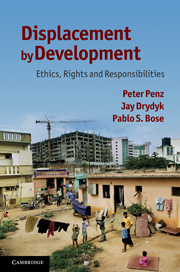Book contents
3 - Defining displacement for and by development
Published online by Cambridge University Press: 05 June 2012
Summary
In the previous chapter we noted that conflicting meanings of ‘development’ have complicated resolution of conflict over displacement. With this in mind, it is important for development ethics to approach this issue with a conception of development that is not biased a priori either against ‘managerial’ or ‘movementist’ orientations. At the same time, it needs to be noted that our primary concern is actually with the meanings of ‘displacement’ and ‘development’ specifically in relation to each other.
Since these terms have been in common use within the literature for a number of years, we will try to contrast our usage with others'. One lesson we have learned after years of struggling with this terminology is that the most commonly used phrase for this topic, ‘development-induced displacement’, is too broad and vague, especially for purposes of ethical assessment and assigning responsibilities. In this volume, we will not use ‘development-induced displacement’ except when referring to the thinking of those who do. When presenting our own meaning, we will use two concepts that are more precise. For one of these – which will be our primary concern – we use the expression ‘displacement for development’. We locate this category within the broader concept of ‘displacement by development’, which also includes the people displaced by development but not directly targeted by it. Both the narrower and the broader concepts will be discussed at length in the second and third sections of the chapter, but for now we can illustrate the distinction in the following way.
- Type
- Chapter
- Information
- Displacement by DevelopmentEthics, Rights and Responsibilities, pp. 41 - 58Publisher: Cambridge University PressPrint publication year: 2011

